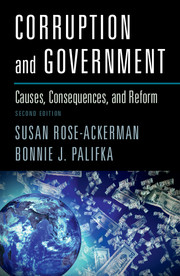Book contents
- Frontmatter
- Dedication
- Contents
- List of Figures
- List of Tables
- List of Boxes
- List of Acronyms
- Preface to the First Edition (1999)
- Preface to the Second Edition
- Acknowledgments
- INTRODUCTION
- 1 What Is Corruption and Why Does It Matter?
- PART I CORRUPTION AS AN ECONOMIC PROBLEM
- PART II CORRUPTION AS A CULTURAL PROBLEM
- PART III CORRUPTION AS A POLITICAL PROBLEM
- PART IV REFORM AGENDAS: DOMESTIC POLITICAL WILL AND INTERNATIONAL INFLUENCE
- CONCLUSIONS
- References
- Index
1 - What Is Corruption and Why Does It Matter?
from INTRODUCTION
Published online by Cambridge University Press: 05 March 2016
- Frontmatter
- Dedication
- Contents
- List of Figures
- List of Tables
- List of Boxes
- List of Acronyms
- Preface to the First Edition (1999)
- Preface to the Second Edition
- Acknowledgments
- INTRODUCTION
- 1 What Is Corruption and Why Does It Matter?
- PART I CORRUPTION AS AN ECONOMIC PROBLEM
- PART II CORRUPTION AS A CULTURAL PROBLEM
- PART III CORRUPTION AS A POLITICAL PROBLEM
- PART IV REFORM AGENDAS: DOMESTIC POLITICAL WILL AND INTERNATIONAL INFLUENCE
- CONCLUSIONS
- References
- Index
Summary
The Millennium Development Goals (MDGs), established in 2000 under the auspices of the United Nations, aimed to reduce extreme poverty to half of its 1990 level, by 2015. This goal was achieved ahead of schedule, by 2010, but as impressive as this achievement is, the gains were not distributed equally across the world: 94% of the reduction in the number of people living in extreme poverty occurred in China. In Paul Collier's (2007) terminology, a “bottom billion” – 1.2 billion people – still live in extreme poverty (less than $1.25 per day) and 2.4 billion live in poverty (less than $2 per day).
Poverty, poor health, low life expectancy, and an unequal distribution of income and wealth remain endemic. Many poor countries have had very low or negative growth rates that challenge convergence models of development. Others have weak economic records in spite of a well-educated labor force. Even some countries that are well endowed with natural resources have poor growth records, low per capita income, and massive inequality. The MDGs set specific global development targets, but fulfilling those goals at the country level has proven much more challenging in some countries than in others.
The world's leaders continue to debate how to move forward. The MDGs, now called Sustainable Development Goals (SDGs), have been reformulated with the shortfalls of the first effort in mind. Recognizing the remaining problems of low growth and development, the World Bank in 2013 announced the establishment of a new mission: eliminating extreme poverty by 2030. Recent data suggest that this goal is overly ambitious for a variety of reasons, including the fact that a large number of people were just below the original cutoff. However, one part of the explanation is dysfunctional public and private institutions that both hold back growth and restrict the flow of benefits to those at the bottom of the income distribution. Neither public funds nor outside assistance are used as effectively as they could be. Low-income countries and those with weak growth records are often in difficulty because they are unable to use their human and material resources to further development and to aid the poorest. These countries need institutional reform, but such reform is difficult. Dams, highways, and port facilities are technically straightforward. Reforming government and nurturing a strong private sector are more subtle and difficult tasks that cannot be reduced to an engineering blueprint.
- Type
- Chapter
- Information
- Corruption and GovernmentCauses, Consequences, and Reform, pp. 3 - 48Publisher: Cambridge University PressPrint publication year: 2016



